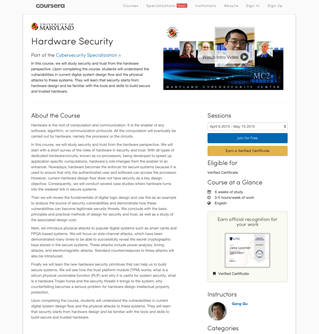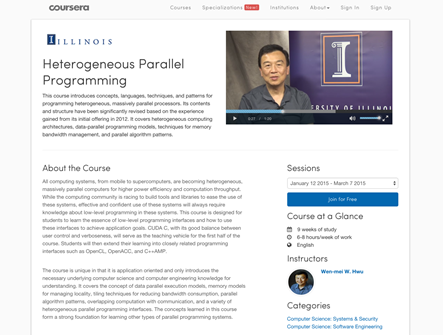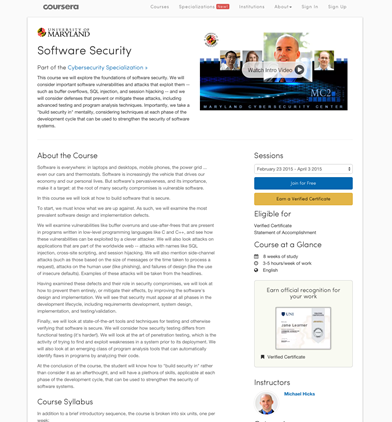To keep up in the world of high tech, IT pros must be constantly refining their existing skills and picking up new ones along the way. These seven free online courses can help.
Always be learning
Big data, open source software, security — these are some of the IT skills most in demand today and for the near future. Fortunately, free classes, in the form of Massive Open Online Courses (MOOCs), are available to help you keep pace with these and many other IT-oriented subjects. Offered by top universities as well as online education platforms (often in partnership), IT MOOCs can help you keep your skills sharp and resume updated.
We searched through the many offerings out there to find these seven courses, which start in the next few months and offer a deep dive on topics relevant to IT professionals. If you don’t find what you want here, browse the lists of other courses offered by these institutions, or check our last MOOC roundup for ideas. Then log on and start learning.
Big Data Applications and Analytics
Starting date: Dec. 1, 2014
(Note: This self-paced course has been live for a year; starting in December it will be refreshed with new lecture material.)
What it covers: Students will explore cloud-based analytics used for processing big data. Taught by Indiana University professor Geoffrey Fox, director of the university’s Digital Science Center, the course covers cloud infrastructure and data analytics algorithms, and discusses solving problems with X-informatics in areas such as physics, e-commerce, health, remote sensing, and Web search and text mining.
Details: Encompasses 24 hours of course material in 12 sections (three of which are optional), plus homework. The class uses Google Plus community forums and Google Hangouts On Air for instructor and student interaction. The course uses either Python or Java, with side MOOCs available for those who need help with their Python or Java skills. Students can earn Open Badges to show that they’ve completed the course.

Starting date: Jan. 5, 2015
What it covers: Part of the cybersecurity specialization at the University of Maryland, this course proceeds from the idea that security starts with hardware design, with students examining case studies in which hardware is a system’s weakest security link. The course, taught by University of Maryland associate professor Gang Qu, then examines specific types of side-channel and physical attacks and new hardware security primitives that can help counter those weaknesses. The goal is to enable students to understand current vulnerabilities and to familiarize them with the tools and skills necessary to build trusted hardware.
Details: The course runs six weeks, with an estimated three to five hours of work per week. The class is hosted on the Coursera online-learning platform, which features peer assessments so students can learn from their colleagues’ evaluations and feedback. For a fee of $49, a verified certificate is available upon completion of the course.
Engineering Software as a Service
Starting date: Jan. 6, 2015
What it covers: Offered by the University of California, Berkeley, this is the second part of a semester-long course. In part one, students developed a simple SaaS application; in this half, students will create more sophisticated apps incorporating relationships between models and JavaScript. They will also use Agile development techniques to refactor and improve legacy code.
Details: This is an eight-week course with an estimated 12 hours of work per week. According to one of the instructors, professor Armando Fox prospective students “should have a solid knowledge of Rails, BDD and TDD, as it assumes and builds on those skills.” Prospective students can review the material from part one to make sure they have the knowledge required. The class is hosted on the edX open-source online-learning platform, which offers discussion forums where students can communicate with professors and fellow students. A verified certificate of achievement is available for a fee.
Heterogeneous Parallel Programming

Starting date: Jan. 12, 2015
What it covers: Taught by University of Illinois at Urbana-Champaign professor Wen-mei W. Hwu, this course starts with an introduction to parallel programming and heterogeneous computing — i.e., systems using more than one kind of processor. Based on the premise that truly effective use of such systems will always depend on familiarity with low-level programming, students start with using CUDA C to learn such skills as tiling, parallel convolution and parallel scan. As the course goes on, other languages are introduced, including OpenCL, OpenACC and C++AMP.
Details: Prospective students should have some C/C++ programming experience. This Coursera class runs for nine weeks and requires an estimated six to eight hours of work per week.

Starting date: Jan. 28, 2015
What it covers: Information Visualization is taught by Katy Borner, director of Indiana University’s Cyberinfrastructure for Network Science Center, with assistance by Scott B. Weingart, a Ph.D. student in information science and history of science, and Michael Ginda, a graduate and research assistant at the center. The course covers algorithms for extracting patterns and trends from data as well as major temporal, geospatial and other visualization techniques. Students collaborate on projects for real-world clients — by way of example, project topics in the previous iteration of the course included the Human Genome Project and Wikipedia.
Every student who registers for this 15-week course course gains free access to IU’s scholarly database of 26 million paper, patent and grant records, and to Sci² Tool, a modular toolset that supports the temporal, geospatial, and topical network analysis and visualization of scholarly datasets. An in-course forum encourages interaction with other students, and a unique hashtag allows students to share their visualizations via Flickr.
Details: Materials from the 2014 class are available as an example on the course website through November 2014. The 2015 course will incorporate updated materials and videos and feature new gaming elements designed to encourage student participation.

Starting date: Feb. 23, 2015
What it covers: Like Hardware Security, this course is part of the cybersecurity specialization at the University of Maryland. Taught by computer science professor Michael Hicks, this course covers the essentials of building secure software, starting with an examination of vulnerabilities in software and on the Web and how attackers exploit them. Students then learn how to prevent or at least reduce the harm caused by such attacks through improvements in software design. The course ends with an examination of software verification and testing tools.
Details: This Coursera class lasts for six weeks and requires an estimated three to five hours of work per week. For a fee of $49, successful students can earn a verified certificate of completion.
Starting date: Anytime (self-paced)
What it covers: This course, offered by the Linux Foundation, is overseen by Jerry Cooperstein, the foundation’s training program director. It covers both graphical user interfaces and the use of the command line, and accommodates all the major Linux distributions. Students end up with a solid working knowledge of the tools and techniques used by Linux system administrators. Teaching assistants monitor the course, and there is a discussion forum for students to post questions about the material and engage with their colleagues.
Details: The course requires an estimated 40 – 60 hours of work in total. Students who complete the work satisfactorily and follow the edX Honor Code are entitled to a certificate of completion.
Via: itworld




Leave a Reply